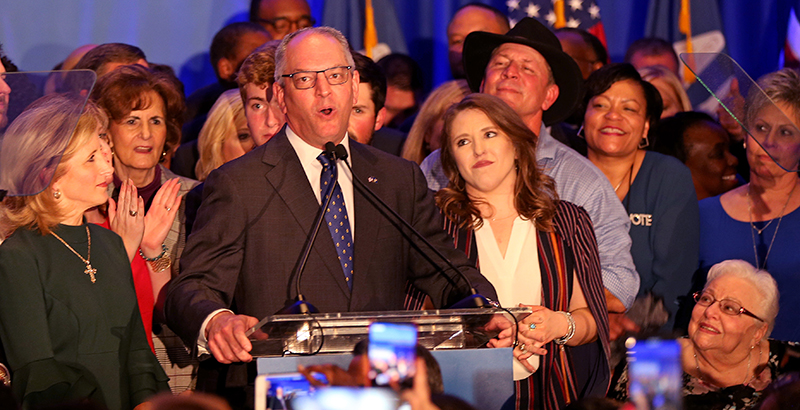EDlection2019: Louisiana Gov. John Bel Edwards Keeps the Democrats Rolling in the South

On Saturday, Louisiana Gov. John Bel Edwards beat Republican challenger Eddie Rispone to became the state’s first Democratic governor since 1975 to be elected to a second consecutive term. The race, decided by just 40,000 votes out of more than 1.5 million cast, allows the party to retain control of its only governorship in the Deep South — and will be seen as a major disappointment to President Donald Trump, who campaigned vigorously to lift Rispone’s chances.
Edwards will continue to govern in cooperation with significant Republican majorities in the Louisiana state legislature. The same electorate that narrowly favored him in the gubernatorial race also empowered a Republican supermajority in the state Senate (i.e., enough to override the governor’s veto) and nearly did the same in the House of Representatives.
The opposition of those conservative lawmakers — as well as a reform-friendly Board of Elementary and Secondary Education, elected last month — will effectively constrain Edwards in driving his second-term education agenda. A staunch ally of state teachers’ unions, Edwards has led several efforts to slow the growth of charter schools and make changes to the Louisiana teacher evaluation system; all died lonely deaths in Baton Rouge.
The weekend results burnished an already-strong off-year election season for Democrats, who captured Kentucky’s governorship and both houses of the Virginia legislature earlier this month in races that touched frequently on K-12 schooling.
Elsewhere, Republicans elected a new governor of Mississippi, though they put up the party’s weakest statewide margins in over a decade. And in one of the most closely watched local elections in the country, a slate of union-backed candidates flipped Denver’s school board, long a stronghold of education reform consensus.
In Kentucky, Democratic Attorney General Andy Beshear declared victory after besting incumbent Gov. Matt Bevin by 0.4 percent in a test of voters’ partisan attachments. In spite of the state’s right-leaning political orientation — and President Trump’s personal appeal to local voters on Monday night — Bevin wasn’t able to overcome his own unpopularity. After contesting Beshear’s tiny margin of victory for over a week, Bevin at last conceded the race last Friday.
Beshear’s strongest allies in the race were educators, who donated over $1 million to his campaign and canvassed energetically to get out the vote. Capitalizing on widespread ire toward the incumbent — Bevin had proposed to “break the backs” of teachers unions that twice led walkouts in recent years — Beshear promised a significant pay raise and called for an end to the state’s “war on public education.” Political observers noted that keeping the focus on local issues allowed the Democrat to overcome a huge partisan disadvantage.
At the local level, unions made their presence felt in the Denver school board race, backing the winners in at least two of three contested seats on the seven-member board and leading in a third as this article was published. The results will give union-supported members a majority on the board, which has been dominated by education reformers more or less continually over the past 15 years.
That period of control coincided with the district’s pursuit of a “portfolio model” of education in which schools gained greater autonomy over operational decisions and charters proliferated broadly. While many families in the city’s traditionally underserved precincts appreciated new education options, a spate of school closures also rankled the community. The disaffection bred a movement to “flip the board”; on Tuesday night, candidates like 21-year-old Tay Anderson, a recent graduate of Denver Public Schools, did just that.
Democrats in Virginia also ended a long period in the wilderness, winning majorities in both houses of the General Assembly to take unified control over state government for the first time since 1993. By wresting away two seats in the State Senate and six more in the House of Delegates, the party — which also holds control of the governorship — will be able to work its will in the capital.
Although gun control, rather than education, was the main issue powering those victories, K-12 schools will still feel a major impact from Tuesday’s results. The state Board of Education has recently released new spending guidelines that could result in hundreds of millions of dollars in extra funding being directed to high-need school districts — all of which will require legislative approval that Democrats are now in a position to provide. The party is also rumored to be considering an end to Virginia’s 72-year-old “right to work” law, which unions say unfairly restricts labor organizing.
Get stories like these delivered straight to your inbox. Sign up for The 74 Newsletter

;)
